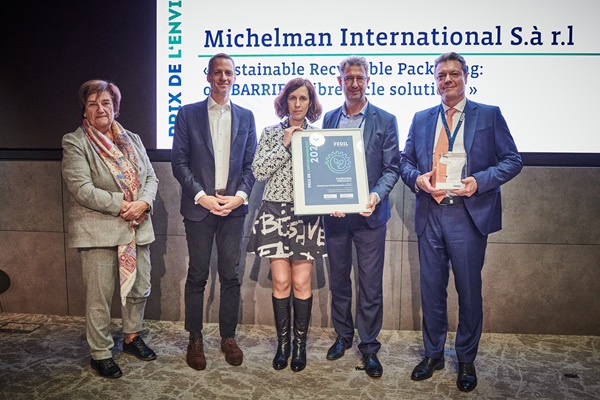 Michelman International Sarl;
Credit: FEDIL
Michelman International Sarl;
Credit: FEDIL
On Tuesday 21 November 2023, the FEDIL Environment Prize ceremony took place, in the presence of Serge Wilmes, Luxembourg’s Minister for the Environment, Climate and Biodiversity, and numerous guests, members of the jury as well as the winners of the 2023 edition.
For this eighteenth edition of the FEDIL Environment Prize, thirteen projects were submitted, among which the jury, made up of experts from the public and private sectors, awarded three prizes, namely:
• 2023 Environment Award in the “Product” category: Sustainable Recyclable Packaging: oneBARRIER FibreCycle solutions by Michelman International Sarl
As part of the EU strategy, which sets new targets in terms of reducing packaging waste and recycling plastic packaging waste, Michelman International has developed, in collaboration with two partners, “OneBARRIER FibreCycle", a high-barrier paper packaging solution that can be recycled into the current paper waste stream and provides a sustainable alternative to non-recyclable high-barrier packaging structures, such as multi-material complex laminates using aluminium or metallised sheets. With a focus on dry food applications, it provides moisture and vapour barriers for product protection.
• 2023 Environment Award in the “Process” category: upGRADE from the Ceratizit Group
As part of an ambitious sustainability strategy, Ceratizit has expanded its product portfolio with new sustainable grades called “upGRADE KLC20+” and “upGRADE CT-GS20Y” which have a very low carbon footprint. In the field of carbide tools for wood machining, the KLC20+ grade, produced in Luxembourg, can be used for saw teeth and knives, and also for bars. The new KLC20+ grade with a low carbon footprint combines maximum performance with recycled raw material. The KLC20+ grade, produced in Luxembourg, uses recycled zinc powder, reducing waste and energy consumption. It offers high performance while maintaining product quality.
• 2023 Environment Prize in the “Management” category: Wastewater treatment plant: Treatment and recycling of wastewater from production from Brasserie Nationale SA
Concerned about reducing its environmental impact, and in particular reducing its consumption of quality water drawn on site for production purposes, the Brasserie Nationale (Bofferding Brewery) decided to invest in a wastewater treatment plant with the objective of reusing wastewater and to significantly reduce its water consumption. Integrated on the Bascharage site, the new wastewater treatment and recycling installation has enabled the Bofferding Brewery to save nearly 50% in water since its commissioning at the end of 2022. Whereas in the 1980s, twelve litres of water were necessary to produce one litre of beer, several investments had already made it possible to reduce this to four litres of water for one litre of beer. Thanks to the wastewater treatment plant, the Bofferding Brewery was once again able to reduce the quantity of water required by 50%. The plant comprises a 600 m3 capacity bioreactor, a BRM unit, and a reverse osmosis filtration system, treating 360,000 litres of water daily.
These three projects met the criteria set out in the regulations for the Environment Prize awards, namely ecological interest, innovative character, sustainable development and practical application. The winners received diplomas as well as films designed specifically for the occasion and which illustrate the respective projects.
In her speech preceding the presentation of the Environment Prize awards, the president of FEDIL, Michèle Detaille, praised the quality of the projects presented as part of this competition, which proves that companies are ready to engage in the debate to help mitigate climate change. This finding illustrates the attitude of the industrial community in Luxembourg which continues to believe that Europe's climate leadership can create one of the greatest opportunities for future prosperity. However, to do this, FEDIL noted it is essential to strengthen industrial manufacturing capacities, reconsider the energy strategy, develop renewable energies more quickly and strengthen administrative capacity in order to speed up authorisation procedures. The decarbonisation of Europe could not be the result of its deindustrialisation, FEDIL pointed out.
Prof. Stefan Lechtenböhmer also delivered a keynote on the theme: “The challenges of industrial decarbonisation - can the EU remain competitive? ". The presentation explored the fundamental challenges facing European heavy industries as they transform into a low-carbon economy. In this context, current German strategies and policies to support industries during the transition were examined.








